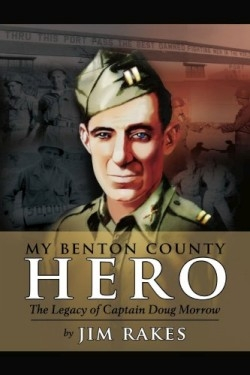My Benton County Hero
The Legacy of Captain Doug Morrow
Writing a military memoir is like marching across a field of land mines without detection equipment. For one thing there’s the impulse to romanticize the hate-driven drama that brews armed conflict to begin with. Depending on when the memoir is written there is the pitfall of an imperfect memory assuming the writer wasn’t note-taking mid-battle. And as many veterans have said sometimes certain truths are too painful to fully reveal.
My Benton County Hero gets it pitch-perfect from the start. One reason is the author’s modesty: Rakes’ preoccupation is less with his own valor as a member of the 936th Field Artillery Battalion during the Korean War than with creating a tribute to his fellow soldiers and their leader First Lt. Doug Morrow. Yet Rakes’ aim isn’t hagiography: he acknowledges that Morrow was not someone normally appearing in academic histories. The point of the book is that Rakes’ experience was his own and that Morrow was not some iconic hero but individual man with great gifts.
Rakes’ descriptions of battles fought won stalled lost are unembellished and drawn with a superb sense of self-perspective—he was an Arkansas teenager when he joined the service. Rather than straining to poeticize war he asks the reader to feel its ebbs and flows: “The way the war heated up and cooled down so fast it was like a magnifying glass floated over on a regular basis everything burning around us until the glare of it moved off to punish some other outfit.”
All of Rakes’ character sketches are distinctive in that he expresses only what is indelible: the man for instance who cried uncontrollably when his buddy was accidentally bisected by a six-inch projectile. He recalls the service that followed—led by Morrow—who asked Rakes to read from Ecclesiastes with its familiar admonitions about a time of war and a time of peace. But he notes “We were a long way from peace. Schultz had his now though. ‘Rest in peace’—that’s what you usually heard during a memorial like this. Some of us—I’m sure I wasn’t the only one—were trying not to think ‘rest in pieces’ instead.”
Given the book’s title it’s ironic that Morrow isn’t omnipresent. Still Rakes seems secure in the integrity of his tale so if Morrow doesn’t fit where it’s going he hews close instead to what he recalls allowing Morrow to emerge precisely as a leader should. This includes the moment written with stoicism when Morrow is killed. Following his death writes Rakes “I understood that I was sitting next to the body of the man who had held my hand and guided me from being a reckless teenager into manhood. It was the most important thing that anybody had ever done for me and I realized that…I had never said thank you.” Now he has.
Reviewed by
Leonard Jacobs
Disclosure: This article is not an endorsement, but a review. The publisher of this book provided free copies of the book and paid a small fee to have their book reviewed by a professional reviewer. Foreword Reviews and Clarion Reviews make no guarantee that the publisher will receive a positive review. Foreword Magazine, Inc. is disclosing this in accordance with the Federal Trade Commission’s 16 CFR, Part 255.

